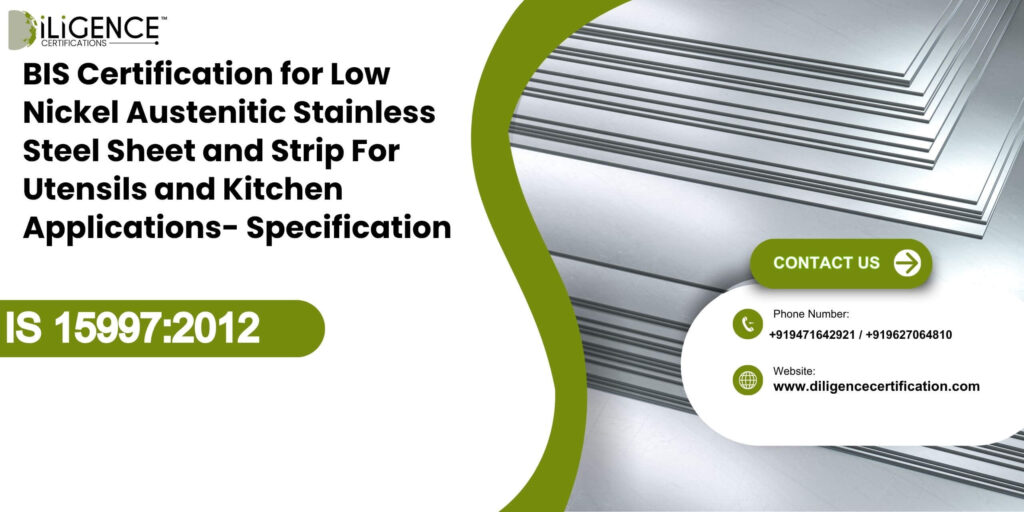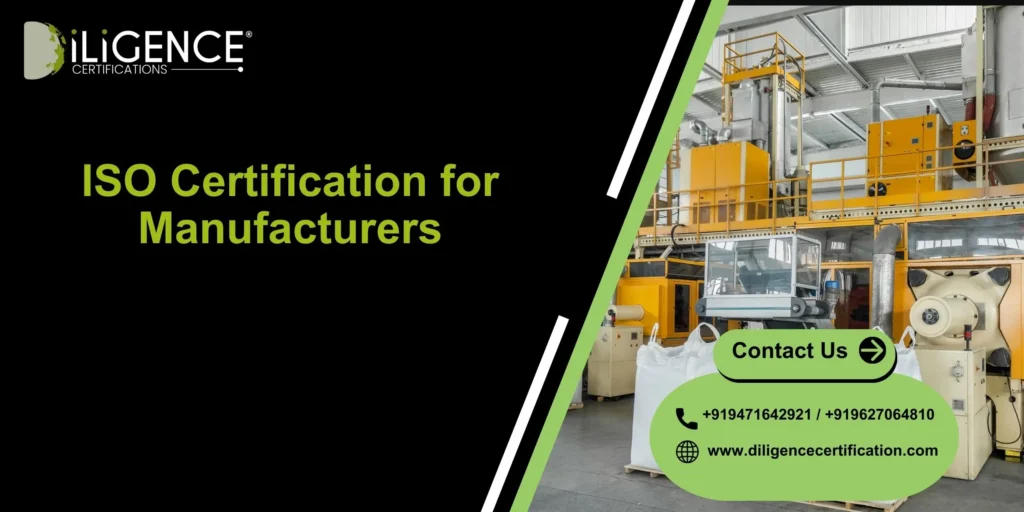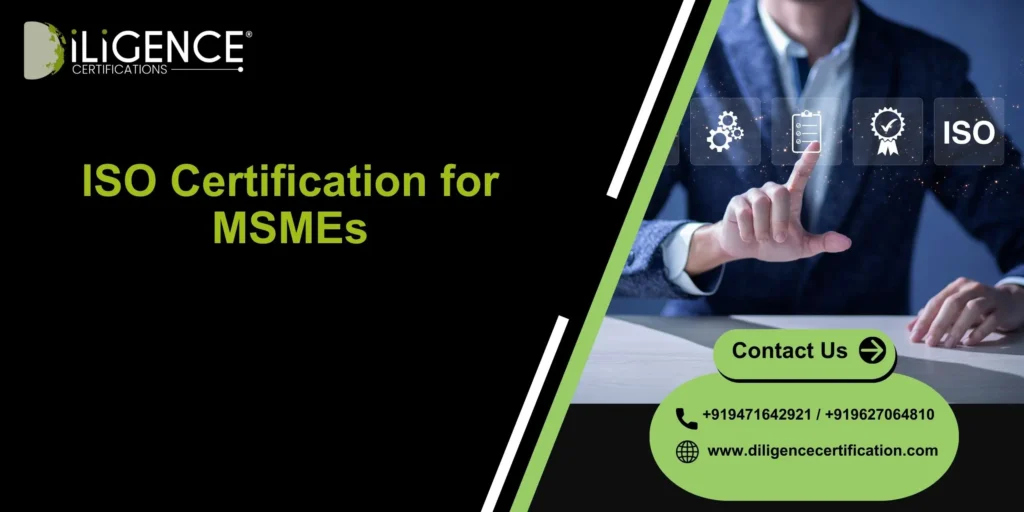- The mandatory BIS certification is the guarantee of safety and compliance of low-nickel austenitic stainless-steel sheets used as utensils under IS 15997:2012.
- It governs the chemical composition, corrosion resistance, and mechanical properties of the material for kitchen applications.
- It is a must for manufacturers, importers, and private-label utensil brands that are operating in India.
- The certification is an obstacle to the occurrence of quality issues such as rusting, pitting, and forming behaviour that is not uniform.
- It enables the brands to gain trust, fulfill the buyer’s expectations, and be free of legal or market-entry time delays.
Introduction
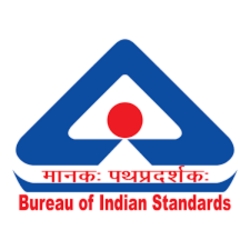
It took a utensil manufacturer from Coimbatore a compliance gap to realize how expensive it can be when their shipment of low-nickel stainless-steel sheets was held up due to a lack of BIS approval under IS 15997:2012. The stoppage of production, the slipping of delivery commitments, and the whole mess going back to one missing certification were the outcomes of the incident. BIS Certification for Low Nickel Austenitic Stainless Steel Sheet and Strip for Utensils and Kitchen Applications – Specification IS 15997:2012 is the standard that now establishes trust, safety, and market readiness of utensil-grade stainless steel in India. Bureau of Indian Standards
What is IS 15997:2012?
IS 15997:2012 is a standard defined by the Bureau of Indian Standards that outlines the quality, composition, and performance features of low nickel austenitic stainless steel sheets and strips, which are the consumable materials for the fabrication of utensils and kitchenware. The standard aims at making material that is safe for food, a material that is resistant to acid and salt, and a material that is mechanically compatible with the forming processes used in the manufacture of the cookware.
Key Points:

- Applies to 200-series low-nickel stainless-steel sheet and strip.
- It defines the chemical composition with the limits that assure the material to be used in direct contact with food without any risk.
- Includes mechanical and corrosion-resistance requirements.
- Ensures consistent quality for utensil and cookware production. ISI MARK
- Mandatory BIS certification is required for manufacturing or importing these materials.
Why is BIS Certification Mandatory
BIS certification is required in order to ascertain that low-nickel stainless-steel sheets and strips of the type used for utensils conform to the safety and quality standards specified in IS 15997:2012. The standard thus safeguards consumers against corrosion, metal leaching, and fragile material performance, as well as ensures that substandard products do not enter the market.
Key Points:
- Protects consumers from unsafe or poor-quality stainless steel used in kitchenware.
- Regulates chemical composition to control nickel release and corrosion.
- Ensures consistent mechanical properties for deep drawing and utensil forming.
- Prevents substandard imports from entering the Indian market.
- Builds trust for cookware brands and reduces product failures and recalls.
Importance and Benefits of BIS Certification
| Importance | Benefits |
| Ensures the stainless-steel material is safe for food contact | Reduces risk of corrosion, pitting, and metal leaching |
| Confirms the material meets IS 15997:2012 quality requirements | Improves product durability and performance in utensils |
| Mandatory for manufacturing and importing low-nickel sheets | Prevents shipment delays, penalties, and compliance issues |
| Builds trust with retailers and kitchenware brands | Enhances market acceptance and customer confidence |
| Controls composition and mechanical consistency | Minimises defects during forming, stamping, and deep drawing |
Step-by-Step Process of BIS Certification

Step1:Documentation
- Collect required technical documents
- Prepare product specifications
- Gather company registration details
- Ensure documents follow BIS format
Step2:Product Testing
- Send samples to a BIS-approved lab
- Conduct safety and quality tests
- Receive test reports
- Confirm compliance with BIS standards
Step3:Application Submission
- Fill out the BIS application form
- Upload all required documents
- Attach valid test reports
- Pay the necessary BIS fees
Step4:Scrutiny and Inspection
- BIS reviews submitted documents
- Authority verifies test results
- Factory/product inspection may occur
- Clarifications requested if needed
Step5:Grant of License
- BIS approves the application
- License number is issued
- Product can carry BIS mark
- Renewal required before expiry
Documents Required for BIS Certification
| Category | Documents Required |
| Business Documents | Business license/registration, ISO certificate, organizational details |
| Manufacturer Details | Factory layout, process flow chart, machinery list, production details |
| Product Documents | Product specifications, component list, user manual, model details |
| Testing Documents | Test report from BIS-recognized lab, sample details, test request form |
| Legal & Compliance | Authorization letter, brand ownership proof, trademark certificate (if any) |
| Import/Foreign Manufacturer (If applicable) | AIR (Authorized Indian Representative) details, contract agreement, overseas manufacturer documents |
Timelines, Costs, Validity & Renewal
- Timelines: Usually from 20 to 30 days, with only 7-15 days for the testing.
- Costs: The cost of the government and the test varies depending on the product. There can be some additional charges though.
- Validity: The validity period is 2 years in most situations.
- Renewal: The renewal is done before the expiration; there should be updated documents/tests; the renewal
Why Choose Diligence Certifications
- Expert team with strong BIS and regulatory knowledge
- Fast, streamlined processing to reduce approval delays
- Accurate documentation and testing coordination
- Transparent guidance with clear communication
- High success rate and complete end-to-end support
Conclusion
A utensil manufacturer from Coimbatore recently contacted us after his stainless-steel coils were held at Chennai port because they lacked the BIS Certification for Low Nickel Austenitic Stainless Steel Sheet and Strip for Utensils and Kitchen Applications – Specification IS 15997:2012 and the ISI mark for IS 15997:2012. His supplier had shared a generic “food-grade” declaration, but Customs only accepts compliance with Indian standards. Similar issues are now common as regulators tighten control over kitchenware-grade stainless steel. Certification has become a necessity for manufacturers and importers, not only for legal compliance but also for the stability of the supply chain and the reputation.
Frequently Ask Questions
IS 15997:2012?
IS 15997:2012 is an Indian Standard defining the chemical composition, mechanical properties, and quality of low-nickel austenitic stainless-steel sheets and strips to be used in utensils and the kitchen.
Are nickel-low stainless steel sheets used for the fabrication of utensils required to have BIS certification?
BIS certification is mandatory that has to be achieved for the manufacture, import, and sale of low-nickel austenitic stainless steel sheets and strips based on IS 15997:2012 in India.
Who is in charge of filing the BIS certification under IS 15997:2012?
According to the Government regulations, such a move should be undertaken by manufacturers and importers of low-nickel stainless-steel, private-label kitchenware brands, and foreign manufacturers that supply material to India.
What is the main work undertaken in testing the product for certification?
The major testing concerns that are addressed by a product's chemical composition include the product safety and longevity, mechanical tests like tensile strength and elongation, and corrosion resistance tests.
What will happen if the shipment reaches India without BIS approval?
Local authorities who mention that they will detain, reject, or return shipments without the BIS license, also state that producers will be confronted with stoppage of production, penalties for the period of storage, and monetary losses.
How long is the BIS certification procedure?
The entire operation usually spans from 20 to 30 workdays and additionally considers the product testing period of 7 to 15 days.
What is the term of a BIS license under IS 15997:2012?
A BIS license is essentially valid for two years, and it is possible to renew it once the applicant provides updated test reports and documents.
Can Non-Indian Manufacturers Acquire a BIS?
Certainly. Nonetheless, a foreign manufacturer must have an Authorized Indian Representative (AIR) in India and follow the FMCS (Foreign Manufacturers Certification Scheme) condition.
What are the major documents required for BIS certification?
Besides these, there are company registration documents, product information, factory layout, machine details, BIS test reports, trademark documents (if the case may be), and authorization letters, among other documents.
Could the manufacturers of the utensils or cookware implement the use of materials that do not have ISI marking?
No. The use of non-certified or non-ISI-marked stainless steel by a manufacturer's means may put the manufacturer at risk of legal penalties, product recalls, and retailers and Customs officials' disapproval.






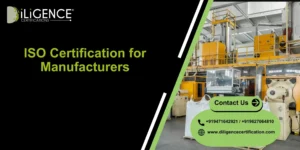
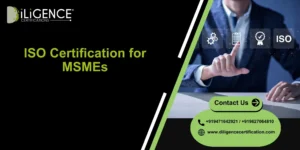
 BIS Certification
BIS Certification
 CDSCO
CDSCO
 CPCB
CPCB
 LMPC
LMPC
 WPC Approval
WPC Approval
 Global Approvals
Global Approvals
 TEC
TEC
 ARAI
ARAI
 BEE
BEE
 ISO Certification
ISO Certification
 DGCA Certification
DGCA Certification
 NOC For Steel
NOC For Steel



















 Business Registration
Business Registration















 Legal Services
Legal Services
 Trademark Registration
Trademark Registration
 Copyright Registration
Copyright Registration
 Patent Registration
Patent Registration
